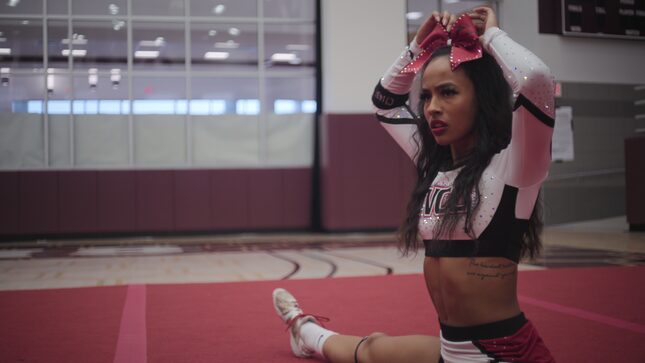Cheer Star Jada Wooten Is a Role Model, Despite What Anyone Says
The breakout star of the Netflix show's second season speaks on her terminated contract with Rebel Athletic and the uphill battle Black cheerleaders face.
In DepthIn Depth

Jada Wooten is not a blend-into-the-background sort of athlete. The 20-year-old former Trinity Valley Community College veteran cheerleader, who became a newly minted star of Netflix’s sophomore season of Cheer and one of the few Black women on the show, doesn’t half-ass her skills. She says exactly what she means, and never apologizes for being authentically herself.
That’s why two days before the start of Black history month, Wooten, in signature Jada “fuck the judges” fashion, put her own voice in the foreground, front and center. Wooten signed a contract with Rebel Athletic Cheer and Dance, a cheer apparel brand that also represents Cheer alum Gabi Butler, as a sponsored athlete after signing on to appear in the popular docuseries. On Tuesday, however, she spoke out in an Instagram post saying Rebel had uninvited her from a scheduled meet-and-greet at Stone Briar Mall, as well as scheduled appearances at a National Cheer Association (NCA) event and Cheersport because she “didn’t fit” their brand. Wooten says the company told her during a phone call that “moms won’t want their daughters taking pictures with you,” in part because she used “too much foul language” on the show. Wooten then announced that she had decided to terminate her contract with Rebel indefinitely.
“Truth is I don’t fit the Rebel or the tour brand. I’m too much and there’s no room for all of me there. I won’t ‘clean up my language’ to appease them in order to fit in. Because you know what? It never stops there. There will always be one more ‘too much,’” she wrote.
Wooten also noted that she was “not invited” to the Cheer Live Tour, sponsored by Rebel Athletic and co-created by Navarro coach Monica Aldama. Notably, other Navarro and TVCC cheerleaders were cast in the tour, including Gabi Butler, Maddy Brum, Angel Rice, Dee Joseph, Morgan Simianer, James Thomas, Jeron Hazelwood, Gillian Rupert, and Cassadee Dunlap.
Fellow Cheer fan favorite La’Darius Marshall also posted on Instagram in Wooten’s defense, calling her a “Black Queen” and commenting on Wooten’s post that “Rebel has been fake.”
“As black people we don’t always get a second chance or time to be ourselves only what others want us to be. We remained ourselves whether the camera was there or not. We didn’t do it for the game, we didn’t do it for the following, we did it because this is our stories and who we are,” Marshall wrote.
In response to Wooten’s claims, a spokesperson from Rebel confirmed to Jezebel in a statement that Wooten’s “choice of words in Cheer Season 2″ didn’t bode well for their median audience, which is between “8 to 10 years old.”
“We asked her to sit out 3 meet and greet events that would attract a younger audience. We offered other opportunities and asked Jada to appear in our lookbooks. Jada chose to decline those offers, and instead she asked to terminate her relationship with Rebel in its entirety,” the statement reads.
Wooten told Jezebel in a phone call Tuesday afternoon that she had zero interest in the fame that joining the cast of Cheer offered, nor did she ask to be on the show. Just like Rebel, the show’s producers came to her. Due to her natural intensity and focus, she suspected that viewers would either love her or hate her. Though, she never could’ve anticipated the restrictive expectations that would be placed on her as a role model for young cheerleaders—a position she didn’t ask for in the first place.
-

-

-

-

-

-

-

-

-

-

-

-

-

-

-

-

-

-

-

-

-

-

-

-

-

-

-

-

-

-

-

-

-

-

-

-

-

-

-

-








































